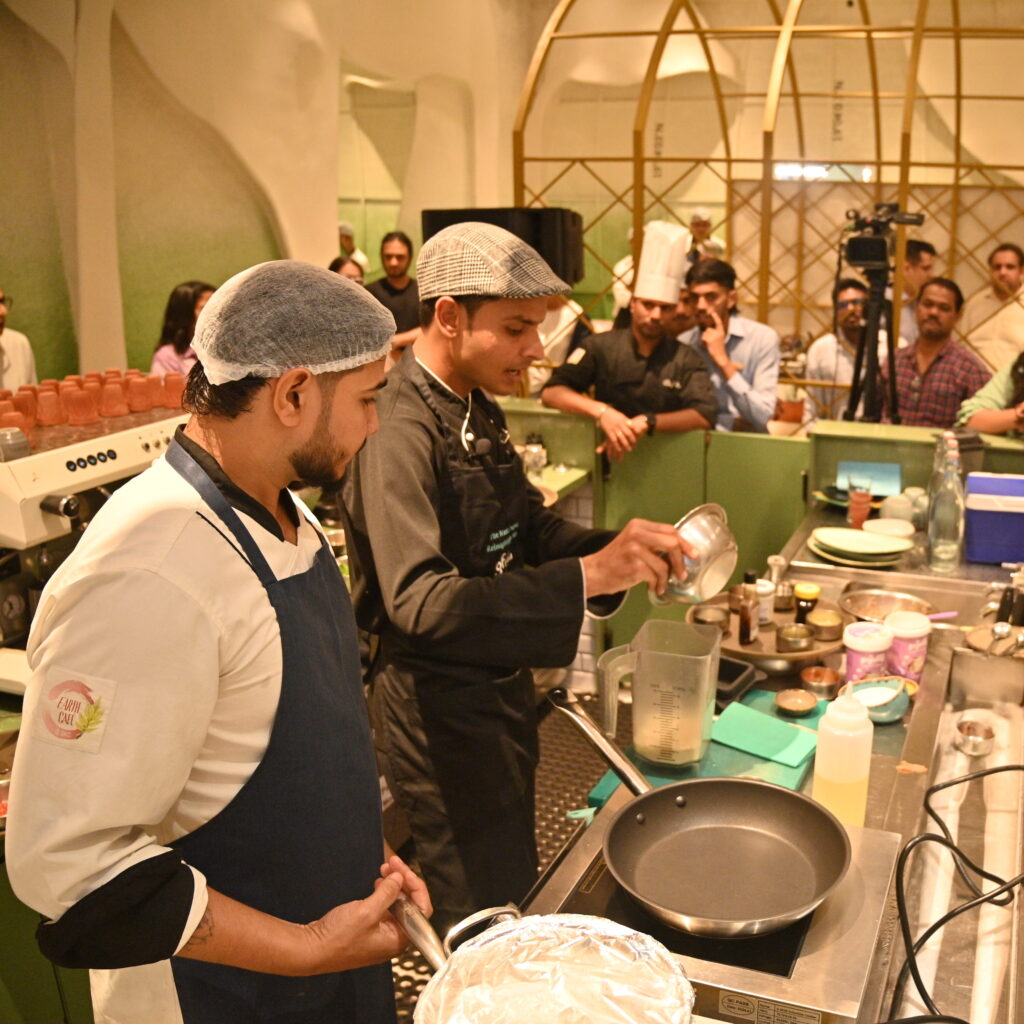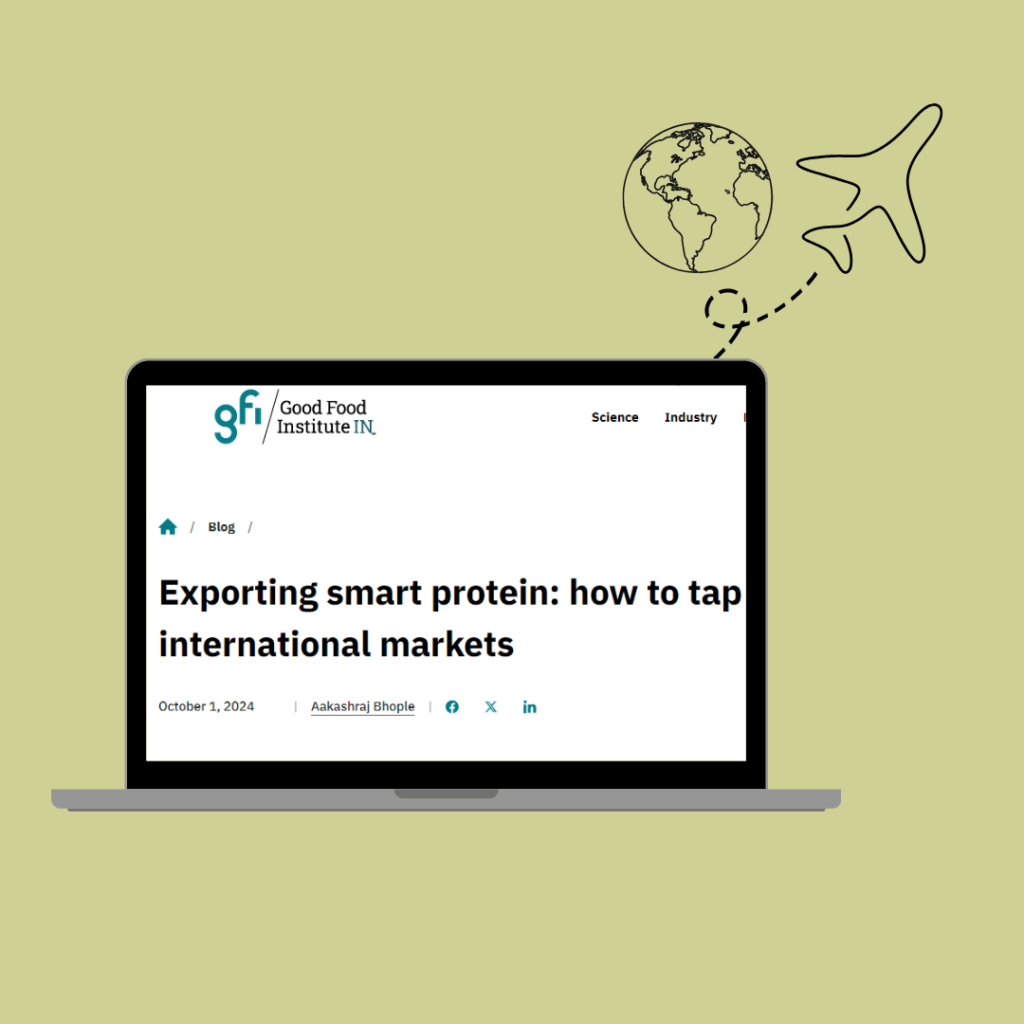
Entrepreneurship
Getting started
Step 1: Surround yourself with other smart protein champions
The first step to building a startup in an emerging space like smart proteins is connecting with like-minded people who can help you navigate it. The GFIdeas India Community, which is now 1000+ members strong, offers opportunities to connect, learn, and collaborate, all with a shared goal of advancing smart proteins. Join now.
Step 2: Get smart about smart proteins
Understanding technology and commercialisation opportunities is crucial in your startup journey. Our free massive open online course (MOOC) is a great place to start and covers everything from the biological and chemical processes used to produce plant-based meat and cultivated meat to the environmental and economic drivers behind these market sectors and the dietary roles of proteins. Learn more.
To understand the Indian smart protein landscape and its evolution over the years, you can go through our 2023 State of the Industry Report. For a more expansive view, our global reports also dive deep into the key technologies, business developments, and scientific advances.
Step 3: Build your smart protein business
Brainstorm for your smart protein solution that plugs into sector whitespaces and market gaps. Discover ideas for new startups, commercial ventures and products, research, ecosystem support, and investment opportunities in our Alternative Protein Solutions Database.
New to the smart protein landscape? Peruse our comprehensive database of Indian companies active in plant-based, fermentation-enabled, and cultivated proteins to understand what cutting-edge innovations are leading the movement. Access now.
Step 4: Collaborate to assume scale
GFI India maintains a dedicated set of databases to help startups form connections and thrive in the Indian market. Whether you’re looking to hire skilled talent, fundraise through investors, access grants, join accelerator or incubation programmes, connect with key ecosystem players like contract manufacturers, consultants, and suppliers, or even just understand the competitive landscape our ecosystem toolkit promotes discovery, simplifies collaboration, and drives startup success.
If you are looking for mentorship as your startup scales, the GFI Mentor Program offers 1:1 mentoring sessions with subject matter experts across the global alternative protein ecosystem. Request mentoring here.
Here are a few resources to help you think through your scale-up and partnership-building journey:
Scaling up and partnerships: What do alt protein industry experts say?
Finding your market
Given the dynamic nature of this sector, finding the right market for your unique solution can be challenging. However, with the help of our resources, you can navigate these complexities. Target markets may shift over time and you need a resilient go-to-market strategy. For more resources on finding the right market, head over to our market and consumer insights section.
Once you have narrowed down your target market, the next step is to make your smart protein products accessible to your consumer base. Here are a few resources to help you think through your distribution and potential export strategies for expansion:
Fundraising
The first step in your fundraising journey is to build a compelling pitch deck, which outlines your funding needs and growth strategy.
Here are a few general pointers to keep in mind when crafting your deck:
Exhibit evidence of current or future customer traction, market pull, or product-market fit.
Even in pre-R&D, you can provide evidence of consumer demand for your product through creative ways like focus groups, surveys, product crowdfunding pre-sales, and letters of intent from future customers.
Outline your go-to-market strategy.
Whether you’re launching direct-to-consumer, B2B, or through food service, illustrate how your go-to-market strategy will shape your product formulations, marketing plan, company culture, and fundraising ability.
Identify your value proposition and what makes it defensible.
Investors want to see that you’re innovating in product development rather than pursuing a short-term market niche. Demonstrate your key differentiator from other companies pursuing the same market.
Calculate or project your unit economics.
The venture capital model is driven by exceptional returns. You must showcase a clear path to profitability at scale. Knowing your unit economics—even if based on assumptions— is critical to demonstrating feasibility.
Tell a compelling story.
If you are mission-driven, lead with your purpose, but don’t rely solely on the environmental, ethical, and socio-economic challenges of animal agriculture to make your pitch compelling. Investors want more. Focus on what makes your company and product unique and well-positioned to succeed.
Finding talent
Building the right team of smart protein all-stars is crucial to your startup’s success. To get you started, we have curated a database of students, researchers, and professionals actively seeking opportunities in smart protein— organised to help you find the right talent. Fill out this form to gain access.
Here are some additional resources:
Product development
Creating excellent smart protein products and solutions is critical to market success, as highlighted by experts. You can explore options like building an in-house research team, collaborating with academic institutions, or working with third-party manufacturers to develop products. Once the product is formulated, manufacturing options like commercial kitchens, food incubators, or co-packers/co-manufacturers can be considered for production scale-up. We have multiple resources to guide your journey like this co-packer evaluation checklist and this article on devising your scale-up strategy for long-term profitability. For more such insights, visit our manufacturing section.
Regulation
A detailed understanding of the current regulatory status of plant-based, fermentation-derived, and cultivated meat products in India is essential to your market success, and we want to ensure you remain up-to-date given the dynamic nature of the sector.
Plant-based
Plant-based protein alternatives to meat, eggs and dairy have been in the market for a while, and continue to diversify and scale on key parameters through innovative inputs and technologies. These products utilise ingredients that have been standardised by the FSSAI in the Food Safety and Standards (Food Product Standards and Food Additives) Regulation, 2011, but are new applications/formats of those ingredients that have not been defined by standards and hence are mostly classified as proprietary products. There are over 73 plant-based meat, eggs, and dairy companies with over 377 products across 41 formats in the market.
Fermentation and microbial proteins
In 2022, under its Approval for Non-Specified Food and Food Ingredients Regulations (“NSF Regulation”, the FSSAI granted prior approval (pre-market approval) to two smart protein products–ACME’s mycoprotein derived from Fusarium venenatum and Perfect Day’s non-animal derived whey protein that utilises precision fermentation. In 2023, the Food Safety and Standards Authority of India (FSSAI) granted prior approval to Reliance’s phototrophic algal biomass-derived protein powder NSF Regulations. In 2024, Nature’s Fynd received regulatory approval from the FSSAI for its biomass fermentation-derived Fy Protein (Nutritional Fungal Protein derived from Fusarium str. flavolapis). A few more fermentation-derived companies are in the process of applying for regulatory approvals.
Cultivated meat
While the FSSAI has not received any application for cultivated meat product approval yet, it is considering the regulatory requirements for CM positively. Some Indian startups are at an advanced stage of R&D and are considering applying for regulatory approvals. The FSSAI also formed a working group on cultivated meat (called Working Group on Cultured Meat) in 2020 with regulatory and scientific experts to understand the possible regulatory pathways for cultivated meat in India. GFI India shared information with and presented to the Working Group on the scientific developments, market status, and regulatory status of cultivated meat in other countries and recommended a regulatory roadmap for India. The findings of the Working Group have not been publicly shared yet.
As you explore global expansion, it’s helpful to consider regulatory developments for novel smart protein products across key markets like Singapore, the U.S., Australia-New Zealand, South Korea, Israel, the UK, the EU, Thailand, China, Japan, Canada, and Brazil to understand how they are supporting alternative protein innovation and commercialisation.
GFI India dedicatedly works to simplify the regulatory path to market for smart protein companies in India through regulatory guides developed in partnership with experts, spanning topics like advertising and claims, company incorporation, import, labelling, and FSSAI licensing.
If you would like to connect directly with regulatory experts with specialised knowledge in food laws, intellectual property, corporate regulations, and compliance tailored to the smart protein sector, you can reach out to our Regulatory Advisory Council.


















